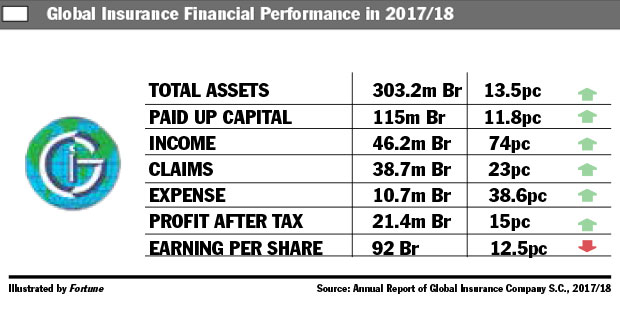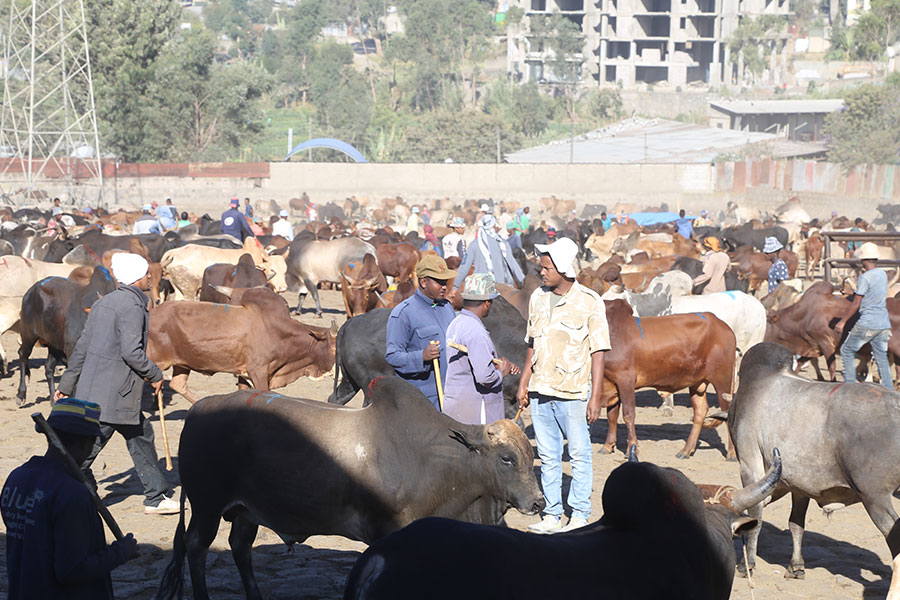
Radar | Aug 26,2023
Yonas Ademassu, married with two children, hails from the small hamlet of Jiga, Gojam Zone of Amhara Regional State.
His early childhood was spent in the rocky lowlands of southern Gojam helping out his farming family with chores, attending an elementary school in Jiga and walking about 14Km each way to go to the nearest high school in Fenote Selam.
He moved to Addis Abeba to join his brother where he completed his high school education while also working at a grain mill operated by his brother. Yonas spent all of his free time helping in his brother’s mill business.
He next landed in Bulgaria in 1988 with a scholarship and in a few years he moved and settled in London where he met his wife.
With the support of African Educational Trust, he achieved his BA degree in Electrical & Electronics Engineering and followed with an MSC in Business Information Technology.
In 2004, Yonas passed the prestigious Financial Risk Management examination and became a fully certified financial risk manager at the Global Association of Risk Professionals.
Following completion of his education, Yonas embarked on a finance career in London’s investment banking sector. Starting with Misys Group, he moved on to BNP Paribas and JP Morgan before he became a vice president of Credit Suisse.
Yonas’s life took a completely new turn on 2014 when he came across United States-grown teff in one of London’s health food stores. He was stunned to learn that it wasn’t the Ethiopian teffhe hoped but a commercially cultivated teff variety that was about to conquer London’s growing health food sector.
"From that moment on the seed for the company, Lovegrass Ethiopia, was planted in my head," Yonas said. “I found it impossible to reconnect and focus on my banking job.”
His mind wandered back to his childhood when he spent days helping his family on their small tefffarm. He felt the soothing morning dew of his childhood on his bare feet again.
He felt compelled to bring the story of Ethiopian teffto the world, to tell the journey of the Ethiopian farmer who toiled the land for millennia and harvested this tiny grain year after year, and now to discover that the market is being taken over by others.
Teff, EragrostisTefor Williams Lovegrass, is a tiny seed native to Ethiopia.
It is believed to be the most ancient grain that originated between 4000 BC and 1000 BC. For thousands of years, teff has been the main ingredient of injera, the staple food that every Ethiopian depends on.
Yonas Admassu, who hails from the lowland teff farms of Gojam, ventured into the food market by happenstance. He has now taken to packaging and selling teff products in the United Kingdom, under his own company, Lovegrass Ethiopia.
Teffgrain and flour is full of nutrition and naturally gluten-free (unlike wheat, barley or rye). Gluten is suspected of causing celiac disease, an immune reaction that creates inflammation and damages the small intestine's lining, leading to sometimes serious medical complications.
It is also a source of easily digestible proteins and various trace elements such as calcium and magnesium. Teffis known to improve heart problems, assist in weight loss, support strong bones and generally provide a tonic to the immune systems.
As a large population of the country depend on this grain, the nation's 43-year old gene bank, Ethiopian Biodiversity Institute, has routinely been conducting nutritional and other analyses on the grain, according to Tamene Yohannes (PhD), director of crop and horticulture at the Institute.
The Institute has catalogued 6,414 teffvarieties among the nearly 72,874 genetic material it keeps an horticulture crop products in Ethiopia.
"Various research institutions and universities access the varieties for research," Tamene said.
Yonas has also made it his mission to enable the world to recognise teff for its Ethiopian origin and to share its benefits. He is planning to create a strong Ethiopian brand that connects the world’s customers to its roots.
“The grain already has lost its exclusivity and has been globalised, and a Dutch company has secured patent rights,” he said. “We have to accept it as a global crop and come out to the market competitively by adding value to it.”
As part of this journey, Yonas returned to Addis Abeba in 2015 keen to enter Ethiopia’s name in the arena of the global market.
Yonas then started a year-long struggle to obtain an investment license and land to build a cereal processing factory, in Sululta, a town outside Addis Abeba.
“I have sacrificed the last three years to construct the building, fence the premises and pave a road to the factory," he said.
He completed construction eight months ago, but still is unable to obtain electric power supply and the building remains idle.
Frustrated but determined, Yonas returned to London and started looking for European contract manufacturers to help him produce his Ethiopian branded products to start serving the European market.
His answer was to create a new brand, Lovegrass Ethiopia.
The future factory of Lovegrass Ethiopia, at Sululta, a suburb of Addis Abeba, in the final stage of machine installation, where teff made products will be produced.
Headquartered in Kenly, United Kingdom, Lovegrass Ethiopia produces and packs various teffproducts including flour, pancake mix and cereal.
Lovegrass Ethiopia also showcases the world’s first white fusilli pasta, made from 100pc white teffflour.
The company’s products are featured by most prestigious London food retailers including the high-end and 100-year old Selfridges; and Planet Organic, known for its health focus.
In November 2018 Lovegrass Ethiopia entered its products in competition at the Food Matters Live exhibition in London Excel Centre. The teff-pasta was recognised for its origins as an Ethiopian indigenous grain, excellent nutritional values and great taste.
The product, along with seven other innovative food and drink products was shortlisted for the prestigious Innovative Better-For-You Product award of 2018, beating 260 other competitors.
To Yonas’s delight, the teff-pasta scooped the main prize, winning a trophy and a lot of media coverage, especially in the health food sector.
His product has passed through rigorous quality control checks made by a committee, which consists of 24 independent expert judges including doctors of biology and chemistry, nutritionists, food scientists and marketing specialists.
The competition features companies from the saturated European food market, various product certifications, and competitors must exhibit original and clear branding, and convince picky judges that they have quality products.
The product was also exhibited at large exhibitions, where thousands of visitors attended. Before participating in the award-winning London exhibition, Lovegrass Ethiopia took part in the Sial Paris 2018 food innovation exhibition, the world’s largest food and beverage innovation exhibition, where it landed a position as one of the finalists.
“The participation in global exhibitions is about creating noise in the market,” says Yonas with great enthusiasm. “We need to add a story behind the product.”
Lovegrass Ethiopia offers 12 different product varieties already introduced into the market with many more still in the pipeline.
"We have received interest from many global companies and will be entering the international markets in early 2019," Yonas told Fortune.
Yonas still believes that the product needs promotion to bring light to the globe highlighting its origin in Ethiopia.
Kaleab Baye (PhD), a lecturer and researcher for nearly two decades working at the Centre for Food Science & Nutrition at Addis Abeba University, admires the efforts made by Yonas to promote teff-based products in the international market.
“In recent times the world has come to recognise the nutritional values of teffand its versatility as a health food," Kaleab said.
Although Ethiopia is the first country to domesticate teffacross its highlands, a Dutch company, Health & Performance Food International, took patent rights of the grain and registered it in Italy, England, Germany and Austria.
Due to this, the two countries have been in dispute with the Ethiopian government considering legal action.
The Ethiopian Intellectual Property Office was working with other governmental offices in approaching the situation in steps, according to Biruk Workneh, acting director of the office.
Launching public and diplomatic campaigns, then to accelerate and file against the Dutch company and attempting to nullify the patent right registered in different countries, are some of the measures the patent office is considering, according to him.
"Last year, the Ministry of Innovation & Technology submitted all the necessary documents to the Attorney General office for further legal action," Biruk said.
The Office of the Attorney General is investigating the case, according to Zinabu Tunu, director of communication affairs at the Attorney Genera. He declines to disclose the current stage, mentioning the pending status of the issue.
With all the challenges, Yonas believes that teffwill be in demand.
"As technological challenges are overcome in processingteffto make bread and other food products, demand for teffis likely to increase globally,” Yonas says.
Yet Yonas believes that the nation has the responsibility to reap the fruit of the grain.
“It is up to Ethiopians to make sure that the country and its farmers get its rightful global market benefit from this ancient super grain,” Yonas said.
Yonas Admassu celebrates his victory with friends after winning the prestigious Innovative Better-For-You Product award of 2018 in London, beating 260 other competitors.
PUBLISHED ON
Jan 05,2019 [ VOL
19 , NO
975]

Radar | Aug 26,2023

Commentaries | May 31,2020

Fortune News | Apr 20,2019

Fortune News | Jan 13,2024

Commentaries | Apr 17,2020

Commentaries | Sep 10,2023

Viewpoints | Sep 28,2019

Radar | Jan 27,2024

Fortune News | Aug 31,2020

Agenda | Jan 06,2019

Jul 13 , 2024 . By AKSAH ITALO
Investors who rely on tractors, trucks, and field vehicles for commuting, transportin...

Jul 13 , 2024 . By MUNIR SHEMSU
The cracks in Ethiopia's higher education system were laid bare during a synthesis re...

Jul 13 , 2024 . By AKSAH ITALO
Construction authorities have unveiled a price adjustment implementation manual for s...

Jul 13 , 2024
The banking industry is experiencing a transformative period under the oversight of N...

Jul 20 , 2024
In a volatile economic environment, sudden policy reversals leave businesses reeling...

Jul 13 , 2024
Policymakers are walking a tightrope, struggling to generate growth and create millio...

Jul 7 , 2024
The federal budget has crossed a symbolic threshold, approaching the one trillion Bir...

Jun 29 , 2024
In a spirited bid for autonomy, the National Bank of Ethiopia (NBE), under its younge...